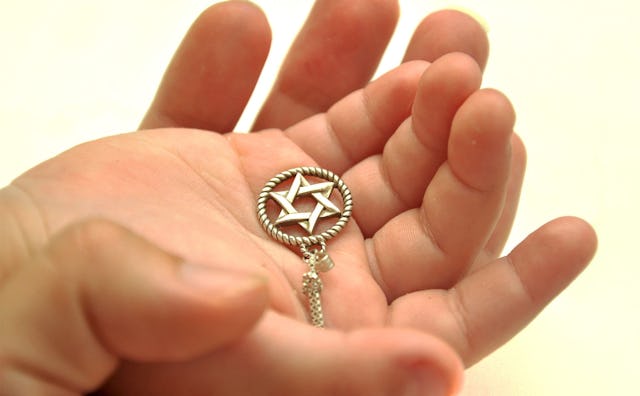What Every Jewish Girl Learns From Her Mother

Long before helicopter mom-ing was even a thing, there was the Jewish Mother. All powerful, all knowing, always ready with a hug and a warm bowl of chicken soup to cure whatever ailed you or to encourage you in your endeavors. Actually, forget the endeavors. Let me make you a plate of something, you’re so skinny. You have nothing to eat?
The skillful art of food-pushing is one of the many lessons every Jewish girl learns from her mother. It matters little if it’s the skinny jeans or the fat jeans she’s wearing. When it comes to meal planning or hosting holiday dinners, more is always better. To a Jewish mother, we will always look like we’re not eating enough, and she will always send us home at the end of the evening with a Bloomingdale’s big brown shopping bag full of leftovers: beet salad, half a brisket, kasha varnishkes and matzo balls to last us weeks. “You should have it, just in case,” mother will insist.
We learn through repeated encouragement to marry a “nice Jewish boy,” though if we stray we are forgiven and reminded that Judaism runs through the mother. “As long as you raise the grandchildren Jewish,” she’ll say. There should be lots of Jewish grandchildren.
Daughters of Jewish mothers are a special breed. Some of our lessons are outright, some more subtle. We learn, for example, that mandatory Shabbat dinners at home can be less about the religious observance and much more about getting the whole family to sit down for a meal together at least once a week.
When trying to figure out if a boyfriend is worthy of our time and attention, we consider Shabbat dinner the litmus test: If we’d feel comfortable bringing him home to our mother’s Shabbat dinner table, he’s a keeper; if we’d be too embarrassed, we should probably cut that cord.
We learn that brains and dorkiness are much more important than money and good looks when choosing a life partner. Brainiacs will learn to make money, and a dork will treat us like the queens we are. Money doesn’t hurt, though.
Some lessons are universal in nature but seem as if they could only have been instated by our Jewish mothers. It’s helpful to think of Emily Post converting and changing her name to Emily “Shayna Punim” Postensteinowitzky-berger. Then follow all her rules. Never show up as a guest in someone’s home without a gift for the host, for example.
When in doubt about what to do or how to behave in a given situation, we learned from our Jewish mothers to offer food. Similarly, when someone we know is in a time of distress or personal tragedy, we send a platter of bagels instead of flowers. And just to be clear, all-healing chicken soup is its own food group. This was particularly important when introducing solid foods to our own babies.
From our Jewish mothers we learned that the cocktail of guilt and superstition is real. Any bad thing that can happen will happen. Jewish mothers taught us that guilt is a way of life and can be harnessed for any and every situation: guilt for eating, guilt for not eating, guilt for visiting, guilt for not visiting, etc. Still, we learned that our Jewish mothers are fine with any choices we make, as long as they’re the exact choices they would have made for us. “I’m fine, don’t change plans for me,” she’ll say. This is code for “I’m uncomfortable. Change all your plans for me.” We learned that if we’re cold, we should tell our children to put on a sweater.
We learned that nothing is ever good enough for us, not the first table we’re brought to at a restaurant nor the first hotel room we’re assigned. When choosing a loaf of bread, we never take the one in front; we take the one behind it (or the one behind that) to ensure fewer hands have touched it. Similarly, even if we watch the bakery clerk serve a half-loaf of bread to the customer in front of us, we must ask the clerk to cut us a “fresh one.”
Every Jewish girl learns to be a nurturer, an endless source of love and compassion to the people in her life, with a borderline unhealthy dose of worry and anxiety. Every knaidel of wisdom bestowed on us by our mothers has come in handy, even the ones we solemnly vowed not to follow. And so, because of and in spite of our Jewish mothers, and much to our husbands’ collective dismay, we learned to be just like them.
This article was originally published on